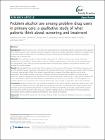| dc.contributor.author | Smyth, Bobby | en |
| dc.contributor.author | Keenan, Eamon | en |
| dc.date.accessioned | 2014-12-11T16:24:55Z | |
| dc.date.available | 2014-12-11T16:24:55Z | |
| dc.date.issued | 2013 | en |
| dc.date.submitted | 2013 | en |
| dc.identifier.citation | Field CA, Klimas J, Barry J, Bury G, Keenan E, Smyth BP, Cullen W, Problem alcohol use among problem drug users in primary care: a qualitative study of what patients think about screening and treatment, BMC Family Practice, 14, 1, 2013, 98- | en |
| dc.identifier.other | Y | en |
| dc.identifier.uri | http://hdl.handle.net/2262/72464 | |
| dc.description | PUBLISHED | en |
| dc.description.abstract | Background: Problem alcohol use is common and associated with considerable adverse outcomes among patients who attend primary care in Ireland and other European countries for opiate substitution treatment. This paper aims to describe patients' experience of, and attitude towards, screening and therapeutic interventions for problem alcohol use in primary care. Methods. This qualitative study recruited problem drug users (N = 28) from primary care based methadone programmes in the Ireland's Eastern region, using a stratified sampling matrix to include size of general practice and geographical area. Semi-structured interviews were conducted and analysed using thematic analysis, and audited by a third reviewer. Results: We identified three overarching themes relevant to the purpose of this paper: (1) patients' experience of, and (2) attitude towards, screening and treatment for problem alcohol use in primary care, as well as their (3) views on service improvement. While most patients reported being screened for problem alcohol use at initial assessment, few recalled routine screening or treatment. Among the barriers and enablers to screening and treatment, patients highlighted the importance of the practitioner-patient relationship in helping them address the issue. Nevertheless, patients felt that healthcare professionals should be more proactive in the management of problem alcohol use at a primary care level and that primary care can play an important role in their treatment. Conclusions: Problem alcohol use is an important challenge in the care of problem drug users. While primary care is well placed to address this issue, little data has reported on this topic. The development of interventions which promote screening and brief interventions in practice are likely to benefit this at-risk group and further research and education, that help achieve this goal, are a priority. Strategies such as dissemination of clinical guidelines, educational videos, academic detailing and practice visits, should be explored | en |
| dc.format.extent | 98 | en |
| dc.language.iso | en | en |
| dc.relation.ispartofseries | BMC Family Practice | en |
| dc.relation.ispartofseries | 14 | en |
| dc.relation.ispartofseries | 1 | en |
| dc.rights | Y | en |
| dc.subject | Screening | en |
| dc.subject | Qualitative interviews | en |
| dc.subject | Primary health care | en |
| dc.subject | Opioids | en |
| dc.subject | Methadone | en |
| dc.subject | Illicit drugs | en |
| dc.subject | Brief intervention | en |
| dc.subject | Alcohol | en |
| dc.title | Problem alcohol use among problem drug users in primary care: a qualitative study of what patients think about screening and treatment | en |
| dc.type | Journal Article | en |
| dc.type.supercollection | scholarly_publications | en |
| dc.type.supercollection | refereed_publications | en |
| dc.identifier.peoplefinderurl | http://people.tcd.ie/smythbo | en |
| dc.identifier.peoplefinderurl | http://people.tcd.ie/eekeenan | en |
| dc.identifier.rssinternalid | 91064 | en |
| dc.rights.ecaccessrights | openAccess | |
| dc.identifier.rssuri | http://www.biomedcentral.com/1471-2296/14/98 | en |
| dc.identifier.orcid_id | 0000-0003-3797-5541 | en |
| dc.contributor.sponsor | Health Research Board (HRB) | en |




